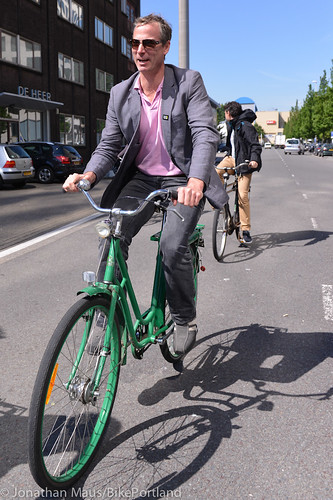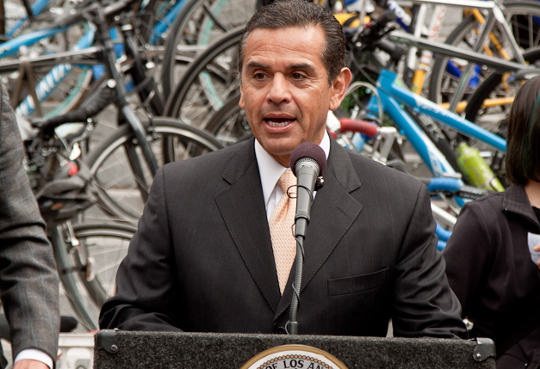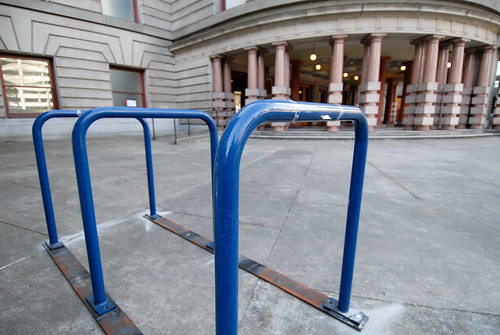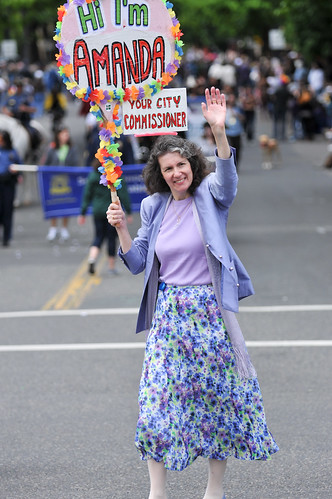In a downtown brimming with bike commuters, there’s still one Portland workplace that currently posts a solid 0 percent bike commute rate: City Council chambers.
Portland’s five city commissioners aren’t opposed to bicycling by any stretch. But, since former Mayor Sam Adams left the council in 2012, none of the city’s leaders regularly spends time on a bike — specifically time that’s not at a special event (like Sunday Parkways, which is far from real-world conditions) or a parade or in some other type of controlled environment.
Does that matter? Does a lack of exposure to real urban cycling conditions make it harder for politicians to understand and care about bicycle issues?
“No,” says Commissioner Nick Fish, maybe the council member who uses his bicycle most (“for fun and exercise,” most recently last fall, he wrote in an email) and whose home near Northeast Portland’s Grant Park is probably in the bike-friendliest location of any commissioner’s. “Advocates have done a great job making the case for a multi-modal transportation system.”
Commissioner Amanda Fritz, who lives in the far southwest corner of Portland, commuted three miles daily while attending college in Cambridge, England in the late 1970s. Today, she wrote in an email, she “hardly ever” rides.
Fritz, too, said that had no bearing on her belief in good biking — no more than her belief in access for people with disabilities depends on how often she uses a wheelchair.
“While I don’t personally enjoy riding a bike, my husband and my older son do,” Fritz wrote. “I appreciate cycling as a healthy transportation option for those who like to cycle, and as a mechanism to reduce pollution and congestion related to transportation. I don’t use a wheelchair, yet I am passionate about providing facilities for those who do. For myself, I am a pedestrian and transit-user as my preferred modes of alternative transportation.”

(Photo J. Maus/BikePortland)
Advertisement
Commissioner Steve Novick, who oversees the city’s transportation bureau, said learning to ride a bike is “on my list, along with learning Italian.”
“I tried to learn to ride a bike when I was nine, and kept on falling off,” said Novick, now 51. Alone of the commissioners, he said the physical experience of biking would help him understand how to improve the city.
“It would be marginally useful, but I think I can appreciate the importance of bicycling,” said Novick, who lives near Multnomah Village in Southwest Portland.
Mayor Charlie Hales, who lives near the Springwater Corridor in Southeast Portland’s Eastmoreland neighborhood, also rides sometimes and, in his speech last month opening the Oregon Active Transportation Summit, used the word “us” to describe advocates for biking and walking.
“I do know he regularly does Sunday Parkways (together with first lady) and they LOVE them,” his chief of staff Gail Shibley wrote in an email. “We also took a bike tour of Milwaukie light rail corridor last year with specific focus on station area planning. Portland Tribune covered. I can report the mayor’s bike looked well used…!”

part of a 2013 study tour with Portland leaders. He’s made the
North Portland Greenway one of his top priorities in office.
Shibley and Hales spokesman Dana Hayes didn’t respond to questions about the last time Hales rode regularly. The office of Portland’s fifth commissioner, Dan Saltzman, didn’t respond to a series of queries. (Saltzman lives in Southwest Portland’s Hillsdale neighborhood.)
While the current crop of commissioners might not be the bike commuting types, Portland certainly has a rich tradition of politicians who were.
From the city’s disgraced but freeway-busting former Mayor Neil Goldschmidt, who in 1971 personally led a 1,200-bicycle ride sponsored by the Bike Lobby advocacy group, to Zoobombing former Mayor Bud Clark to Earl Blumenauer, the former Portland city commissioner who helped sow the seeds of its biking boom and is now one of the only members of Congress who doesn’t keep a car in Washington, bike users have shaped the city for decades. (Vera Katz, the three-term mayor who succeeded Clark and mentored Adams, probably deserves an honorable mention: the former New York City resident didn’t ride a bike but has never bothered to get a driver’s license, either.)

(Photo by Streetsblog LA.)
Nor is there much question that Portland’s surge in bike-friendliness has been echoed in cities across the country thanks in part to a generation of leaders who learned to ride during the 1970s bike boom. Antonio Villaraigosa (born 1953) remade bike policy in Los Angeles after breaking his elbow in an urban bike collision in 2010.
On the other hand, it’s also obvious that leaders can embrace biking without doing it themselves. No U.S. city has more rapidly transformed its biking policy than New York, a city run for 12 years by a billionaire who, maybe deliberately, seems to never have been photographed on a bicycle. Michael Bloomberg’s bike-loving former transportation commissioner Janette Sadik-Kahn has credited her boss’s embrace of biking to a “data-driven” approach that recognized the economic benefits of biking — not unlike the intellectual attitude Novick, Fish and other Portland council members describe.
And ultimately, Portland’s current commissioners aren’t the only politicians in town. At a February debate three months before her commanding victory in the race to become Multnomah County chair, Deborah Kafoury mentioned that she’d recently begun bike commuting.
Clearly, politicians must preside over many issues that they have no direct, personal connection to. But since almost every one of them intimately understands the driving experience and can therefore relate to auto-oriented issues on a personal level, it makes us wonder how a lack of that connection impacts their understanding of bicycling.
What do you think?



